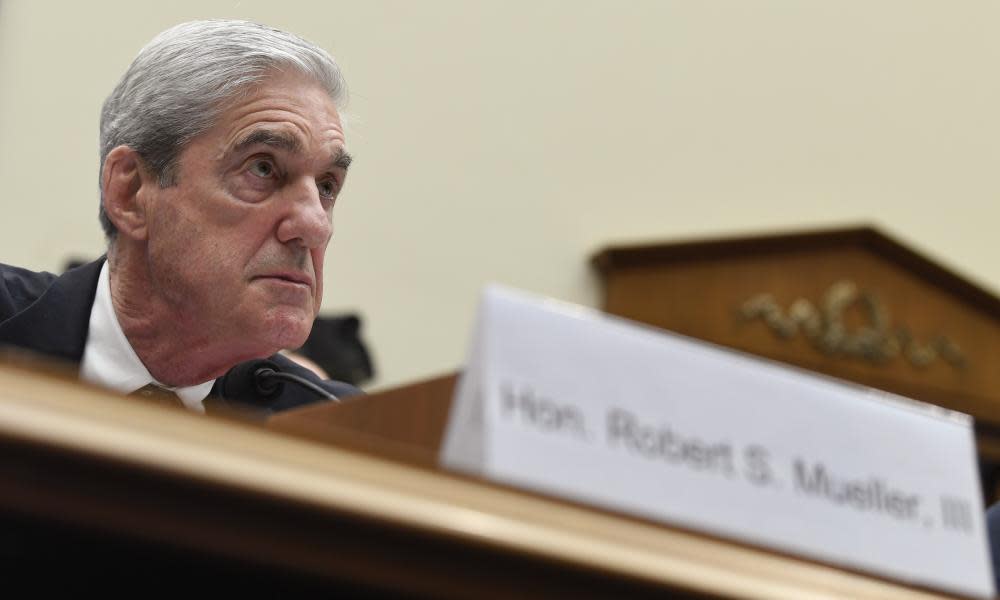Trump in the White House is a national security nightmare – and Mueller knows it

A word of belated advice for dejected House Democrats: believe Robert Mueller next time he tells you in advance that he would be a terrible and reluctant public witness on legal matters.
Appearing before the House judiciary committee on Wednesday morning, Mueller was even more buttoned-down than his crisp white shirt. Not only did the former special counsel refuse to read aloud from his own report (“I’m happy to have you read it,” he said repeatedly), but a flustered Mueller also failed to remember which president had appointed him to his first major justice department post. (It was Ronald Reagan and not, as Mueller guessed, George HW Bush.)
Related: The Guardian view on Robert Mueller’s testimony: what will Democrats do next? | Editorial
The predictable and sometimes tedious judiciary committee hearing proved that Mueller lacks both the prosecutorial zeal and the performance skills to star in a remake of Watergate. Democrats may still try to make the case that Donald Trump perverted justice, but it is hard to see how Mueller helped their cause with his mantra, “I’m not going to speculate”.
By the time the hearing ended at lunchtime, it was not safe for impeachment-minded Democrats to pass too close to an open window on a high floor.
But then in a dramatic rescue mission, reminiscent of the cavalry riding over the hill in an old-time western, Adam Schiff transformed the political equation as he convened the afternoon hearing of the House intelligence committee, which he chairs.
Schiff instinctively understood that Mueller – the straight-arrow marine and former FBI director – is at his core a moralist and a patriot.
Playing to an audience of one in his compelling opening statement, Schiff said: “The story of the 2016 election is a story about disloyalty to country, about greed and about lies. Your investigation determined that the Trump campaign – including Donald Trump himself – knew that a foreign power was intervening in our election and welcomed it, built Russian meddling into their strategy, and used it.”
After describing Trump’s panting eagerness for Russian aid as “disloyalty to country”, Schiff added a sentence that does not normally pop up in the gospel according to MSNBC: “That disloyalty may not have been criminal … but disloyalty to country violates the very oath of citizenship.”
An unfortunate legacy of Watergate is that liberals see everything through a legalistic lens. As we get caught up in the technicalities of what constitutes obstruction of justice (the key offense that brought down Richard Nixon), we tend to lose sight of the deliberate Vladimir Putin-spawned conspiracy to undermine western democracy. And we forget the degree to which Trump was – and may well still be – Moscow’s willing enabler.
At times in 2016, Trump seemed more passionate about building a Trump Tower in Moscow than he was about winning the White House
As the Republicans tried to undermine Mueller by embracing every handy conspiracy theory (somehow they missed the faking of the moon landing), the Democrats on the intelligence committee kept reminding the nation that Trump lied repeatedly about having no business interests in Russia. In fact, at times in 2016, Trump seemed more passionate about building a Trump Tower in Moscow than he was about winning the White House.
This set-up the dramatic final round of questioning as Schiff finally lured Mueller out of his heavily guarded Fortress of His Own Rectitude.
After discussing the potential for Russian blackmail, Schiff asked Mueller: “So if candidate Trump was saying ‘I have no dealings with the Russians’ but the Russians had a tape recording, they could expose that, could they not?” And rather than refusing to speculate or retreating back to the wording of his report, Mueller uttered a powerful one-word answer: “Yes.”
Emboldened Schiff went further as he said, leading the witness: “That is the stuff of counterintelligence nightmares, is it not?” Again, rather than ducking the implications of the question, Mueller replied: “Well, it has to do with counterintelligence and the need for a strong counterintelligence entity.”
Maybe this soundbite will not play powerfully on television (alas, the current standard for political relevance) since there was no yelling or pointing of fingers. But it is telling that Robert Mueller – a terse and reluctant witness who probably wouldn’t speculate about tomorrow’s weather – said, in effect, that Donald Trump in the White House represents the essence of a national security nightmare.
It is folly to immediately predict the reverberations from the most anxiously awaited congressional hearings of the Trump era. But it would be fitting if Trump – like another strutting autocrat named Napoleon – saw his imperial dreams begin to crumble at the gates of Moscow.

